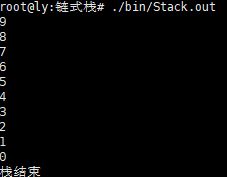Linux学习之路(10)
顺序栈:
main.c
#include
#include "Stack.h"
int main()
{
stack s;
Data i;
Init(&s);
for (i = 0; i < SIZE; i++)
{
Push(&s, i);
}
while(!Empty(&s))
{
printf("%d\n",GetTop(&s));
Pop(&s);
}
printf("栈结束\n");
return 0;
}
stack.c:
#include "Stack.h"
#include
void Init(stack *s)
{
if(NULL == s)
return;
s->top = -1;
}
BOOL Full(stack *s)
{
if(NULL == s)
return FALSE;
if (SIZE - 1 == s->top)
return TRUE;
return FALSE;
}
BOOL Empty(stack *s)
{
if(NULL == s)
return FALSE;
if(-1 == s->top)
return TRUE;
return FALSE;
}
void Push(stack *s, Data data)
{
if(NULL == s)
return;
if(Full(s) == TRUE)
return;
s->data[++s->top] = data;
}
void Pop(stack *s)
{
if(NULL == s)
return;
if(Empty(s) == TRUE)
return;
--s->top;
}
Data GetTop(stack *s)
{
if(NULL == s)
return;
if(Empty(s) == TRUE)
return;
return s->data[s->top];
}
stack.h:
#ifndef _STACK_H
#define _STACK_H
#define SIZE 10
typedef enum{FALSE,TRUE} BOOL;
typedef int Data;
typedef struct Stack
{
int top;
Data data[SIZE];
} stack;
//初始化栈
void Init(stack *s);
//进栈(压栈)
void Push(stack *s, Data data);
//出栈
void Pop(stack *s);
//判断栈满
BOOL Full(stack *s);
//判断栈空
BOOL Empty(stack *s);
//获取栈顶元素
Data GetTop(stack *s);
#endif
结果:
链式栈:
main.c:
#include
#include "stack.h"
int main()
{
Stack s;
Init(&s);
int i;
for(i = 0 ; i < SIZE; i++)
{
Push(&s, i);
}
while(!Empty(&s))
{
printf("%d\n", Gettop(&s));
Pop(&s);
}
printf("栈结束\n");
return 0 ;
}
stack.c:
#include
#include
#include "stack.h"
// 初始化栈
void Init(Stack* s)
{
if (s == NULL)
return;
s->head.next = NULL;
}
// 判断空栈
BOOL Empty(Stack* s)
{
if (s == NULL)
return FALSE;
if(s->head.next == NULL)
return TRUE;
return FALSE;
}
// 入栈
void Push(Stack* s, Data data)
{
if (s == NULL)
return;
Node* node = (Node*)malloc(sizeof(Node)/sizeof(char));
if (node == NULL)
return;
node->data = data;
node->next = s->head.next;
s->head.next = node;
}
// 出栈
void Pop(Stack* s)
{
if (s == NULL)
return;
if(Empty(s) == TRUE)
return;
Node* p = s->head.next;
s->head.next = p->next;
free(p);
}
// 获取栈顶元素
Data Gettop(Stack* s)
{
if (s == NULL)
return;
if(Empty(s) == TRUE)
exit(-1);
return s->head.next->data;
}
Stack.h:
#ifndef _STACK_H_
#define _STACK_H_
#define SIZE 10
typedef enum{FALSE, TRUE}BOOL;
typedef int Data;
typedef struct _node
{
Data data;
struct _node* next;
}Node;
typedef struct stack
{
Node head;
}Stack;
// 初始化栈
void Init(Stack* s);
// 入栈
void Push(Stack* s, Data data);
// 出栈
void Pop(Stack* s);
// 判断空栈
BOOL Empty(Stack* s);
// 获取栈顶元素
Data Gettop(Stack* s);
#endif // _STACK_H_
结果:
链式队列:
main.c:
#include
#include "Queue.h"
int main()
{
Queue q;
Init(&q);
int i;
for(i = 0 ; i < SIZE; i++)
{
Push(&q, i);
}
while(!Empty(&q))
{
Data data = GetTop(&q);
printf("%d\n", data);
Pop(&q);
}
printf("队列结束\n");
return 0 ;
}
Queue.c
#include
#include
#include "Queue.h"
// 初始化队列
void Init(Queue* q)
{
if (q == NULL)
return;
q->front = NULL;
q->rear = NULL;
}
// 判断空队列
BOOL Empty(Queue* q)
{
if (q == NULL)
return FALSE;
if(q->front == NULL)
return TRUE;
return FALSE;
}
// 入队列(尾插)
void Push(Queue* q, Data data)
{
if (q == NULL)
return;
Node* node = (Node*)malloc(sizeof(Node)/sizeof(char));
if (node == NULL)
return;
node->data = data;
node->next = NULL;
if(q->rear != NULL)
{
q->rear->next = node;
q->rear = node;
}
else
{
q->rear = node;
q->front = node;
}
}
// 出队列
void Pop(Queue* q)
{
if (q == NULL)
return;
if(Empty(q) == TRUE)
return;
Node* tmp = q->front;
q->front = tmp->next;
free(tmp);
if(q->front == NULL)
q->rear = NULL;
}
// 获取队头元素
Data GetTop(Queue* q)
{
if (q == NULL)
return;
if(Empty(q) == TRUE)
exit(-1);
return q->front->data;
}
Queue.h:
#ifndef _QUEUE_H_
#define _QUEUE_H_
#define SIZE 10
typedef enum{FALSE, TRUE}BOOL;
typedef int Data;
typedef struct _node
{
Data data;
struct _node* next;
}Node;
typedef struct queue
{
Node *front; //队头指针
Node *rear; //队尾指针
}Queue;
// 初始化队列
void Init(Queue* s);
// 输入队列
void Push(Queue* s, Data data);
// 输出队列
void Pop(Queue* s);
// 判断空队列
BOOL Empty(Queue* s);
// 获取队头元素
Data Gettop(Queue* s);
#endif // _STACK_H_
结果:
顺序队列:
main.c:
#include
#include "Queue.h"
int main()
{
Queue q;
Init(&q);
int i;
for(i = 0 ; i < SIZE; i++)
{
Push(&q, i);
}
while(!Empty(&q))
{
Data data = GetTop(&q);
printf("%d\n", data);
Pop(&q);
}
printf("队列结束\n");
return 0 ;
}
queue.c:
#include
#include
#include "Queue.h"
// 初始化队列
void Init(Queue* q)
{
if (q == NULL)
return;
q->front = 0;
q->rear = 0;
}
// 判断空队列
BOOL Empty(Queue* q)
{
if (q == NULL)
return FALSE;
if(q->front == q->rear)
return TRUE;
return FALSE;
}
//判断满队列
BOOL Full(Queue* q)
{
if (q == NULL)
return FALSE;
if((q->rear+1)%SIZE == q->front)
return TRUE;
return FALSE;
}
// 入队列(尾插)
void Push(Queue* q, Data data)
{
if (q == NULL)
return;
if (Full(q) == TRUE)
return;
q->rear = (q->rear+1)%SIZE;
q->data[q->rear] = data;
}
// 出队列
void Pop(Queue* q)
{
if (q == NULL)
return;
if(Empty(q) == TRUE)
return;
q->front = (q->front+1)%SIZE;
}
// 获取队头元素
Data GetTop(Queue* q)
{
if (q == NULL)
return;
if(Empty(q) == TRUE)
exit(-1);
return q->data[(q->front+1)%SIZE];
}
queue.h:
#ifndef _QUEUE_H_
#define _QUEUE_H_
#define SIZE 10
typedef enum{FALSE, TRUE}BOOL;
typedef int Data;
typedef struct _node
{
Data data;
struct _node* next;
}Node;
typedef struct queue
{
Data data[SIZE];
int front; //队头指针
int rear; //队尾指针
}Queue;
// 初始化队列
void Init(Queue* s);
// 输入队列
void Push(Queue* s, Data data);
// 输出队列
void Pop(Queue* s);
// 判断空队列
BOOL Empty(Queue* s);
// 获取队头元素
Data Gettop(Queue* s);
#endif // _STACK_H_
结果:



